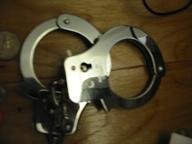Quiz Answer Key and Fun Facts
1. After discussing the plight of a detained traffic violator following a routine traffic stop, two patrol officers decide to "kick" their suspect. Assuming they are acting within the law, what are they actually deciding to do?
2. Near the start of a work shift at three o'clock, two patrol officers are alerted when they hear "three beeps" being broadcast on their police radio. What does the three beeps indicate?
3. Upon their arrival to a crime location, officers are greeted by another officer already on scene. The officer displays four fingers to the arriving officers. What message is he relaying to the arriving officers?
4. While on patrol, officers call on their police radio to request "Code Seven" at a specific location. What are they requesting?
5. While checking a detained subject for 'wants and warrants' the RTO (Radio Telephone Operator) broadcast to the officers that "a Code Six Charles is indicated" on the subject. What message are the officer's receiving?
6. A request is made over the police radio for a unit with "PIT" training. What is being asked for?
7. While on patrol, the officers overhear a "Code Robert" on the radio.
What is a Code Robert?
8. Officers are assigned a call to be handled "Code Three". What are the officers being told?
9. Police officers on patrol spot what they believe to be a "Deuce". In police jargon, what is a deuce?
10. Officers usually respond in mass to a radio call for a "211". What is a 211?
Source: Author
AirBossJohnson
This quiz was reviewed by FunTrivia editor
Exit10 before going online.
Any errors found in FunTrivia content are routinely corrected through our feedback system.

